We read plenty about what book clubs think of authors (and their books). But here's a twist— author Cathy Lamb tells us what SHE thinks of book clubs . . .
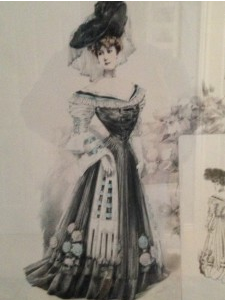 Here is a little secret: I love visiting with book groups.
Here is a little secret: I love visiting with book groups.
I chat with women here in Oregon and all around the country. Over the years I've heard some pretty funny comments—here are a few of the more amusing ones:
“My husband is an a--h--. He’s like Slick Dick in The Last Time I Was Me.”
“My husband gets irritated sometimes with how much time I spend with the kids but I say to him, ‘The kids hug me and want me to read them stories but you always want to have sex. Of course I’d rather read stories.’”
“The guys from the fire department came to take care of my husband, AGAIN, but I knew they thought he was crazy. He thought he was having another heart attack. His third that week. They didn’t say it, but I heard it: My husband is anxious about his anxiety. That’s what causes his heart to beat too fast.”
“My daughter shaves her legs too much. Is that weird?”
“Should we take off our tops like they did in Julia’s Chocolates?”
“Pot is now legal in Oregon. Do you think we should get a joint for the next book club meeting?”
“Did you run naked by a river, Cathy, like Jeanne in The Last Time I Was Me?”
“Oh, my gosh. We finished ANOTHER bottle of wine!”
“You know that sex therapist in your book, Cathy? How did you learn all that?”
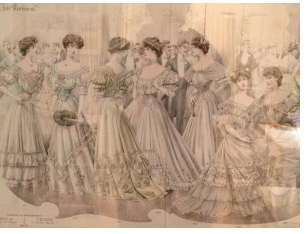 I visit many book groups during the year. If they’re within twenty minutes of my home, I go to their home. If not, we skype or chat via speaker phone.
I visit many book groups during the year. If they’re within twenty minutes of my home, I go to their home. If not, we skype or chat via speaker phone.
I’ve skyped with ladies in New York and Massachusetts, Florida and California, a whole pile of other states, and Canada. If there was a book group on the planet Pluto, I’d skype there, too.
Here’s what I’ve learned: All books groups are fantastically, mightily different from one another.
They all have different goals. Some book groups are very intellectual/literary. I have sat and been drilled about everything from character and plot development, to tone, symbolism, metaphors, pacing, structure, who are my favorite literary writers and why, etc.
Then there are groups who talk about the book half the time and chat and laugh the other half of the time.
There are other groups who read the book, talk about it for fifteen minutes, then dive into their lives. Their book group is a social group. Period. Some of ‘em don’t even hide that anymore.
Then there are groups of women who simply want to meet me, don’t want to talk a whole lot about the book, and did I want more wine? How about a couple more glasses? Beer? Vodka? They have that, too. (I don’t drink, but they do their best to make me happy.) One of my favorite groups only wanted to sit down and have dinner with me. They came in laughing and drank a whole ton of wine. It was a neighborhood book group, no one drove, and they stumbled home singing and chatting. They wanted a nice girlfriend sort of visit. I did not envy them their Book Group Hangovers.
One of my favorite groups only wanted to sit down and have dinner with me. They came in laughing and drank a whole ton of wine. It was a neighborhood book group, no one drove, and they stumbled home singing and chatting. They wanted a nice girlfriend sort of visit. I did not envy them their Book Group Hangovers.
Another book group was the Laughing Book Group. My stomach hurt when I left we laughed so hard. They were all fifty-plus and life was fun.
I once went to a book group that was very, very quiet, almost somber. No one laughed. Not once. They took their reading seriously. I could tell that my book, Julia’s Chocolates, was a wee bit too wild for a few of them. Perhaps they had not liked, Breast Power Psychic Night? Perhaps, Your Hormones and You: Taking Cover, Taking Charge, was a little much? Love scenes too graphic? I don’t know.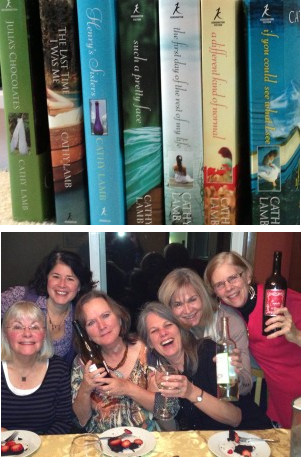 Some groups are small, only four or so women, others are thirty – plus. The age range in most of the groups varies from women in their twenties to women in their seventies.
Some groups are small, only four or so women, others are thirty – plus. The age range in most of the groups varies from women in their twenties to women in their seventies.
They want to know how I come up with my ideas, (wild imagination) how I write the book, (carefully, obsessively) what my daily life is like (just like theirs), are my characters based on real people (no), etc.
Anyhow, ladies, I’m happy to attend your book groups. Email me through my website, and we’ll set up a time.
Happy reading.
Cathy Lamb is a LitLovers author—4 of her books are listed here. We were delighted when she offered to do a guest post.
 By Kristi Spuhler for LitLovers
By Kristi Spuhler for LitLoversFor most of us having a book to read is a given; it's something we take for granted.
But for some a book is a luxury—especially when it comes to underprivileged children whose parents are hard pressed to afford them. Worse: many libraries can't distribute library cards absent a return address.
Without the ability to practice reading, many children fall behind their peers. Here are the dire statistics:
A study by The American Educational Research Association found that 88% percent of children who are not reading on-level by third grade are unlikely to graduate from high school—pretty heavy repercussions from simply being unable to enjoy a book every now and again!Sue Henry wanted to do something in her hometown of Nashua, New Hampshire. So she created a one-time project called BOOKS TO KEEP to bring books to children in a local preschool learning program. That was nearly 20 years ago. Today she and her BOOK CLUB have duplicated the same program in The Villages of central Florida.
Over the last few months, Henry and her book club have delivered 5,000 books through 5 local shelters—and now they’re inviting other book clubs to start their own versions of the Books To Keep, project.
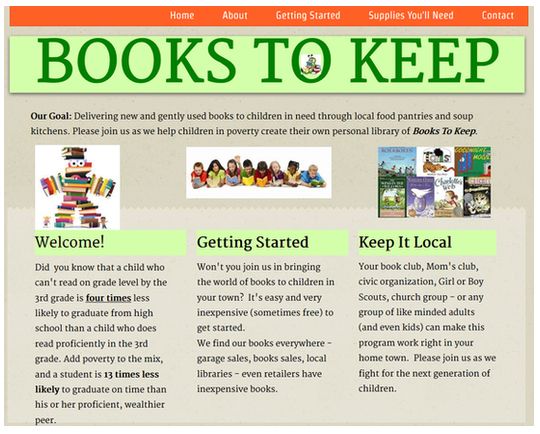
Getting started is simple, and Sue has some suggestions posted right on her site to help you get your project off the ground. To start your own donation organization, all you need to do is collect books, label them and distribute.
The donated books need not be brand new—you’d be surprised what you can find at garage sales, books sales, libraries and thrift stores. Once you begin searching for books and explaining the program, you may be surprised by how excited others are to get involved with your efforts!
The program caters to four basic categories: baby-board books, read-aloud, chapter books and YA/teen fiction. When dropping the books off at the designated pick-up stations, simply divide them into the four categories and wait to see how many of your books are "adopted" by local children in need.
This article from The Village Daily Sun does a wonderful job of outlining the program and displaying the impact Sue has made in just a few short months.
FOR BOOK CLUBS
If you're looking for a community project—a way to make a difference—why not consider starting your own BOOKS TO KEEP program? If you're interested, contact Sue Henry through her website.

February 9, 2014
I loved this website so much, that I created my book club TODAY! Approximately 8 members are IN! So, lets see what happens. I named it after my initials. LOL SO it's called MQ's Book Club.
—from MQ,
Dominican Republic
February 24, 2015
Today is the day. I'll send you the notes and some pictures :D i'm so happy. We are 14 girls now, initially. Let's see if it keeps up.
—from MQ
March 2, 2015
Everything went smoothly.... Everyone was happy to join, and I was so excited to make this little dream come true. Our first choices were "The Little Prince" and "The Old Man and the Sea": because they're classics and easy reads. (I didn't wanna start with a book that could give anyone an excuse not to read!).
—from MQ
And a couple more photos. Congratulations to MQ's BRAND NEW book club!
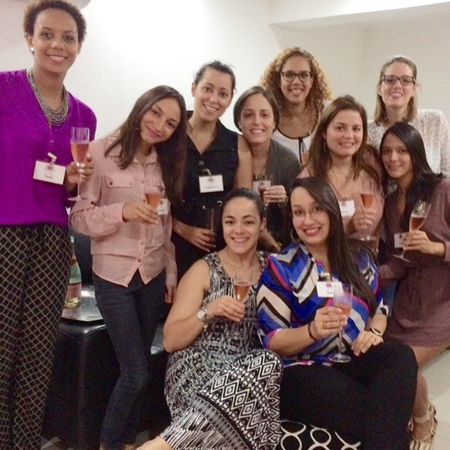
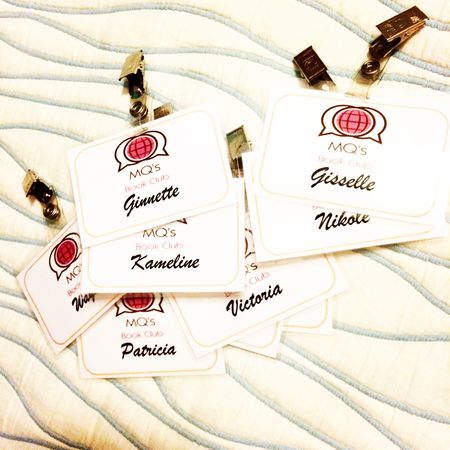
We've got plenty more clubs to read about. Take a look at all of our FEATURED CLUBS...and consider having your club featured on LitLovers.
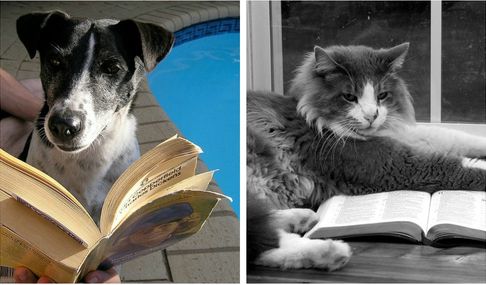
By Kristi Spuhler for LitLovers
We recently came across this article on Bustle that celebrates the literary world of CATS, and that got us thinking—what literary DOGS do people love the most?
A few short months ago, we wrote about dogs making great reading companions, (especially for younger readers who may be struggling,) but now that we’re thinking about it, dogs make some pretty memorable characters in our favorite books as well. Here are just a few that come to mind:
Now that the contenders have weighed in, what do you think? Are dogs or cats more suited to a literary setting?Our 11 Favorite Literary Dogs
Travels With Charley, John Steinbeck
Who better to accompany a lone traveler on a 10,000 mile road trip than their faithful dog?The Curious Incident of The Dog In The Nighttime, Mark Haddon —Though not around for long, Wellington the poodle makes his presence known and sets in motion a monumental chain of events. The Wizard of Oz, L. Frank Baum
Is Dorothy’s companion, Toto, a lovable confidant or a sneaky canine hiding his powers of speech? Turns out, he may be a little of both.Marley and Me, John Grogan
"The World's Worst Dog" ends up teaching his owners about loyalty and unconditional love. Was anyone dry-eyed at the end?The Art of Racing in the Rain, Garth Stein
Confirms what we've know all along: dogs know far more about the human condition than they let on. This one sure does!A Song of Ice and Fire, George R.R. Martin
Direwolves Nymeria, Ghost, Lady, Summer, Shaggydog, Greywind steal the show when found as pups. Though they part ways, they're as much a part of the story as any other character.Call of the Wild and White Fang, Jack London
We follow Buck after he's stolen from his comfortable life and sold into sled dog slavery. In White Fang, we thrill to the growing bond between man and his wolf-dog.; Cujo, Stephen King
Far from lovable, this guy terrorizes the Trenton and Cambers families, to say nothing of readers. A victim of a rabid bat—he was a good dog at heart.Peter Pan, J.M. Barrie
A dog as British nanny? This charming twist is the perfect fit for J.M. Barrie’s fantasy about never growing up.The Phantom Tollbooth, Norton Juster
Tock proves to be a great companion for adventure and one who imparts a little wisdom along the way.Harry Potter, J.K. Rowling
Fang makes recurring appearances thoroughout the series. A Bit of a slobberer, even a coward, he’s still there when Hagrid needs him most.

Gone Girl (Rosamund Pike, Ben Affleck) Before I Go to Sleep (Nicole Kidman, Colin Firth)
LOOK at them! These gorgeous people with their messed-up marriages—they captivate us. Of course, they're just characters out of BOOKS, who now find themselves writ extra large on screen, but still...
 |
 |
 |
 |
 |
 |
 |
 |
| Click on each cover for a summary. | |||
By our count, at least eight domestic thrillers have hit the shelves since 2011 and 2012—with the publication of Before I Go to Sleep and Gone Girl.
Considering the immense attention the books have garnered—both book sales and movie rights—it seems we can't get enough. The question is, why?
Why this morbid fascination? All eight books deal with psychopathically CREEPY marriages; surely, their wide appeal taps into some underlying anxiety on our part. And we haven't even taken TV's Wives with Knives into account!
At the very least, the number of books—and their popularity—suggest a new and disturbing attitude toward marriage, which has always been considered the sine qua non of a fulfilling life. Every single person knows far too well that ubiquitous question, "Ever going to get married?"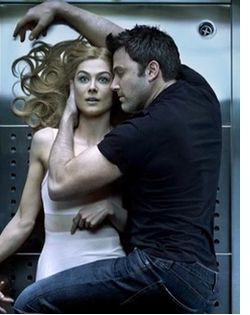 Maybe it's a suspicion of intimacy, a growing fear that genuine connection is unattainable. All the books reflect an innate distrust of "the other"—indeed, their overarching theme is the impossibility of truly knowing another being, even spouses.
Maybe it's a suspicion of intimacy, a growing fear that genuine connection is unattainable. All the books reflect an innate distrust of "the other"—indeed, their overarching theme is the impossibility of truly knowing another being, even spouses.
Or perhaps we suspect marriage is no longer up to the task of functioning as a stabilizing or cohesive force in life. Certainly none of the marriages in these books stave off chaos and loneliness. Just the opposite.
But, oh, pshaw! Here we go again, fooling around with mole hills and mountains. As a genre, creepy thrillers have a long history as great entertainment—think Dr. Jekyll and Mr. Hyde...even Hamlet...or go way back to Oedipus, for that matter. This is probably just one more pop culture phenomenon—like Zombies.
But Dear Reader, it's hard to think all this means NOTHING. After all, isn't literature supposed to be about SOMETHING? (Oh, and the Zombie craze? It's raised similar questions...)
So what do you think? Any ideas?











